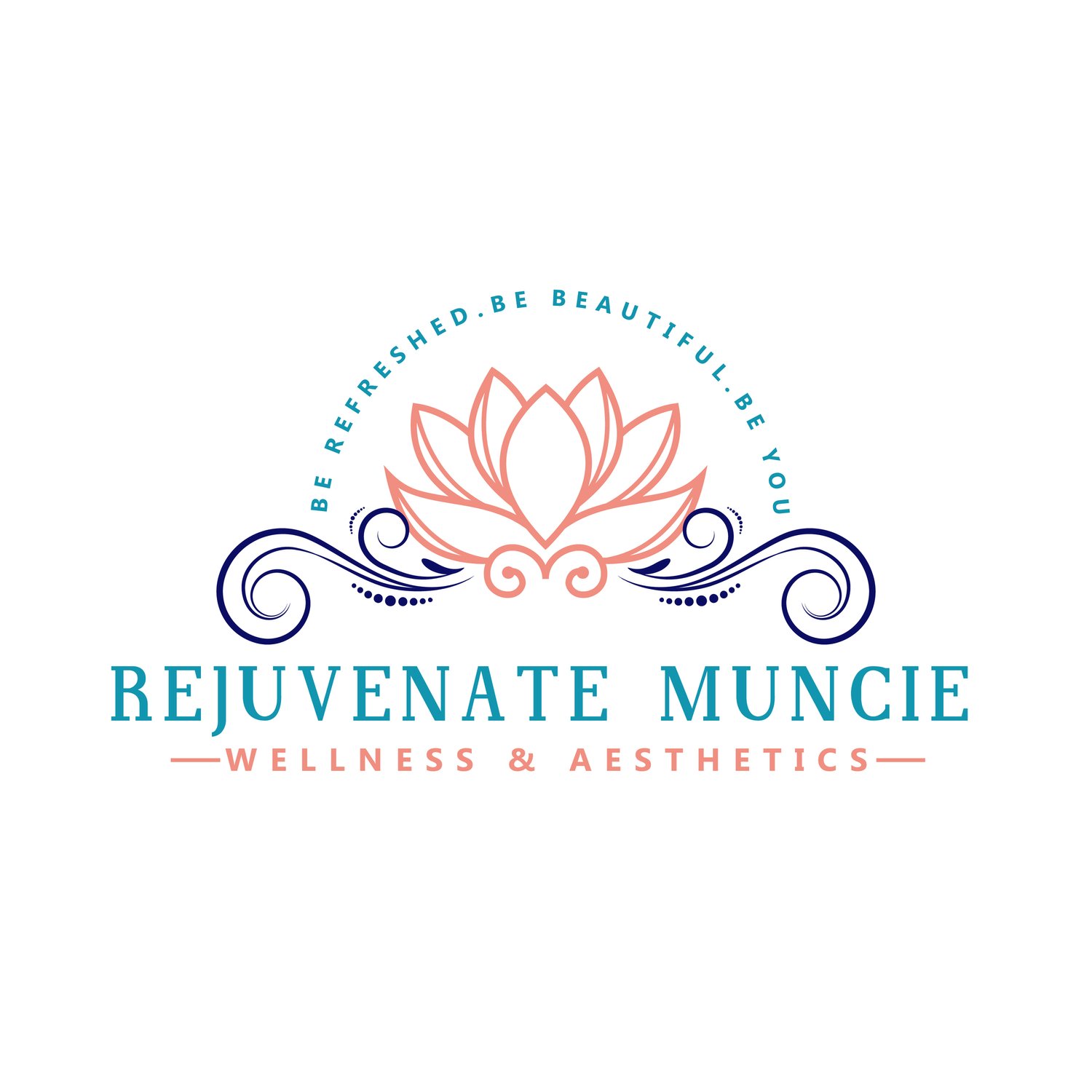
Women’s Health & Hormones
At Rejuvenate Muncie, women’s health regarding hormone therapy is at the heart of what we do. Women’s hormone therapy is still a developing area of healthcare that has been so long overlooked and undertreated. Common concerns that are now addressed by include:
pre-, peri-, and post-menopausal concerns
hair loss
adrenal fatigue
thyroid dysfunction
sexual dysfunction
Not only are these concerns not often “heard” by providers in traditional medicine, women have so often been afraid to speak up about their concerns in the past. That changes today!
Initial Consultation
$100
($75 - current patients on the Total membership program )
30 minutes
During your initial consultation, the provider will conduct a medical history & health assessment screening. She will then discuss your current concerns & wellness goals, review available treatment options, and discuss the potential treatment plan.
Your initial consultation can be completed via video conference or in-person.
There are specific conditions that are not treated in the office and are excluded from treatment due to risk. These will be discussed during the visit.
You will be given an order for lab work during your appointment. All patients are required to have initial labs to initiate treatment and lab work may be repeated at various stages during the treatment plan. Labs are patient and treatment-specific and the cost of labs are not included in the consultation cost.
In some cases, an EKG may also be necessary - you would also receive an order at this time.
We offer low cost, self pay labs via LabCorp
Labs can also be billed through insurance
This will also be completed at LabCorp or may be completed with your PCP
If you have decided to take the next step into REJUVENATING your life at the end of this visit, you will be scheduled for a treatment initiation appointment.
*Once your labs are complete, we will contact you with a treatment plan.
Follow Up
30 minutes
Follow ups are required for all treatment plans. These appointments increase adherence to the program, improve accountability, and ensure that your current treatment plan is helping you achieve your goals. The frequency of these visits will be determined by the provider. If you are on a current program, this fee is covered by the program fee.
Follow ups include:
Vital Signs, including Body Measurements
Reassessment and revision of goals as needed
Reassessment of labs/testing as needed
Note - the cost of lab work is a separate fee.
These appointments can be in-person or telehealth.
FAQs
-
Traditional testing values require a TSH greater than 10 to be considered “hypothyroid”, however, many patients can have symptoms of hypothyroidism with levels as low as 2.5.
Traditional testing of just a TSH does not give a full picture of thyroid function, and very often misses the most common disorder affecting the thyroid, Hashimoto’s.
We assess the full thyroid panel and our goal is not just “normal” levels, but optimal !
Optimal levels are when your thyroid is functioning at its peak.
-
Depending on the cause of your hypothyroidism, your medication may be different. Common treatment options include synthroid, armour thyroid, cytomel, and low dose naltrexone.
-
Hashimoto’s is an autoimmune disorder that attacks the thyroid leading to hypothyroidism. It is commonly misdiagnosed as only Hypothyroidism and therefore is not adequately treated.
It is estimated that 60-80% of hypothyroid disordered are contributed to Hashimoto’s. Hashimoto’s can be detected early with proper and thorough thyroid function testing. While Hashimoto’s is an autoimmune disorder, there are many options available to help mitigate symptoms and slow the progression.
-
OBGYNs and traditional healthcare do not fully assess the need for hormone replacement therapy. Unless the provider has had additional hormone training, this service is outside of their knowledge base. Hormone levels require extensive investigation and often blood testing may not be the best was to evaluate your levels. Additionally, what is considered “normal” to your OBGYN or PCP, is not often considered normal to us.
-
Absolutely not. Testosterone is an essential hormone for women and is a precursor for estrogen.
-
Not at all. Hormones are essential no matter your age or condition and should be treated as such.
-
This will depend on our lab findings. Medications are available in pellets, pills, creams, and injections.
Hormone Replacement Treatments
-
Testosterone Cypionate is an anabolic steroid. In women, the topical form is used. In women, testosterone can enhance sexual desire and increase vaginal lubrication.
https://www.womens-health-concern.org/help-and-advice/factsheets/testosterone-for-women/
-
Estradiol is the strongest form of estrogen in the female body. Estradiol can be prescribed topically to improve vaginal dryness and reduce the incidence and complications of UTIs, bacterial vaginosis, and yeast infections in peri- and post-menopausal women. It can also be prescribed in a pill form that provides systemic benefits that include a reduction in hot flashes and general symptoms related to menopause.
For more information on treatment with Estradiol, please contact the office.
https://www.uofmhealth.org/health-library/d00537a1#:~:text=Estradiol%20is%20a%20form%20of,bone%20loss)%20in%20menopausal%20women.
-
During the menstrual cycle, progesterone stops the thickening of the uterine lining and during pregnancy, it increases blood flow to the uterus to provide for the fertilized egg. Many women suffer from estrogen dominance, in which the estrogen is too great in comparison to the progesterone and the hormones are not balanced - this results in the “menopausal symptoms.”
Therefore, the goal of treatment with progesterone is to offset estrogen dominance and combat menopausal symptoms.
For more information on treatment with Progesterone, please contact the office.
http://oregon-ent.com/patient-education/hw-view.php?DOCHWID=d00550t1
-
DHEA is the precursor hormone to testosterone and can similarly be the cause of low testosterone symptoms. It is used in women to treat Adrenal Dysfunction, Menopausal Symptoms, and Sexual Dysfunction.
For more information on treatment with DHEA, please contact the office.
https://www.mountsinai.org/health-library/supplement/dehydroepiandrosterone
-
One of the first line treatments for hypothyroidism is replacement of the hormone via Levothyroxine or Synthroid. While these medications are similar, they are not the exact same and are not used interchangeable. Levothyroxine is a replacement for the T4 Thyroid hormone.
These medications are usually a good starting point for hypothyroidism, but there are many additional treatment options for thyroid optimization.
For more information check here https://www.medsafe.govt.nz/consumers/cmi/l/levothyroxine.pdf
-
Common vitamin and mineral abnormalities that we treat are: Magnesium, Iron, Vitamin C, Vitamin K, and Vitamin D.
We also use several supplements for treatment of various conditions such as gut health, constipation, fatigue, immune support, insulin resistance, insomnia, stress, and more!
-
Available for both testosterone and estrogen.
Pellets are inserted into the fatty tissue of the buttocks for slow, continuous release. Re-insertion is needed only 3-4 times per year.
During the in-office visit, which only takes a few minutes, patients are brought into the exam room, and the insertion site is numbed. The most common site of insertion is the upper buttocks. A small incision is then made for pellet insertion. Once the pellet is inserted, the insertion site is covered with a small bandage.
This replaces daily and/or weekly medication.



